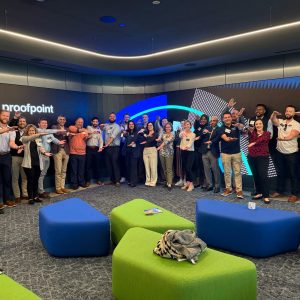Generating the future
Louise Barrere (BSBA, MS-ISOM ’01), Senior Managing Director, Center for Advanced AI at Accenture, helps enterprise clients navigate the rapidly evolving world of AI.
Louise Barrere (BSBA, MS-ISOM ’01) remembers when she first heard about the World Wide Web from her father. With a 35-plus year career at IBM, Barrere’s dad always had a computer at home. It was on the family computer that Barrere taught herself how to code and visited her first website – the University of Florida’s.
Growing up in South Florida and inspired by the experience her sister had as a student, the University of Florida was the only university that Barrere applied to. While she started as a finance major, Barrere’s interest in technology shown through in her classes.
“I met with my guidance counselor, and she recommended that I switch to [Information Systems & Operations Management former program name] DIS because I was taking so many DIS electives and getting As in them,” she recalled. “I think I decided to switch my major that day.”
Learning about how to apply technology in business at the University of Florida provided Barrere with an excellent academic foundation that has enabled her to thrive in her two-decade career with Accenture.
As Senior Managing Director, Center for Advanced AI at Accenture, Barrere is focused on helping large enterprise clients adopt the latest in AI and learn how to use AI within their existing systems. With her foundation in technology and business, she’s able to speak the language of both engineers and executives.
“The mix of business and technology that I got [at UF] was really critical,” she said. “It’s helped me in my role, especially when speaking with senior leaders, to understand that side of business and not just the technology side of things.”
Despite the rapidly changing AI landscape, and a busy personal life as the mom of two boys and dedicated yoga practitioner, California-based Barrere is excited about the constant need to stay up to date with industry advancements to help her clients.
“The pace is unlike anything we’ve experienced,” she said. “It’s happening weekly, almost daily.”
To keep up, Barrere has leaned into Accenture’s focus on upscaling its workforce to meet the demands of AI changes through classes and other opportunities provided by the company. Personally, she makes a point to learn through a variety of resources like podcasts and newsletters focused on the industry.
As a senior leader in AI advancements and utilization in business, Barrere shared her top insights about AI and what we can expect to see in the future.
AI is transforming customer engagement
While practitioners in business know that evolving customer engagement and focusing on personalized customer experiences has been going on for a decade, AI is making huge advancements in what is possible, Barrere explained.
“We’re able to dive deeper into and truly understand who the customer is [because of AI],” she said.
AI driven robotics are changing business processes
AI-powered robots, specifically those embedded with Large Language Models (LLMs), are gaining versatility in how they can help people do things. Technology has long been a partner to people in carrying out tasks, but this new era of AI-human connection will require more trust between people and machines.
Eighty percent of executives agreed that they needed to be communicating their AI strategy to employees in order to build trust, according to the 2025 Accenture Technology Vision report. Similarly, 68% of executives think that they need to upskill their employees to use AI in their work.
“In order to get the value [out of AI], we have to invest in people,” Barrere said. “The more people that are using [AI], the more it will improve and help people with their tasks.”
AI agents have the potential to reinvent every part of a business
Barrere sees the next shift in business AI to be moving from generative AI to agentic AI, in which AI isn’t just generating information but acting on people’s behalf.
“In what’s called agentic AI, a human doesn’t have to prompt the system,” she said. “Instead, agents can collaborate with humans on their processes. It doesn’t just respond, but learns, improves, and works as part of a team and can be utilized in any area, like finance, marketing, sales and supply chain.”
Prepare for the future by using AI (and make it seem less scary)
“The No. 1 step [to prepare for an AI future] is to use it,” Barrere advised. “Do lots of experimentation and look at how you’re already using it in your everyday life.”
Barrere points to examples like a Fitbit counting your daily steps to learning platforms like Khan Academy or Duolingo helping you learn.
Just like adapting to other unfamiliar things in life, Barrere advises the ‘crawl, walk, run’ approach to AI.
“It can feel scary, and it’s easy to imagine these far-off scenarios [of an AI takeover], but these tools are part of everyone’s day-to-day lives,” she said. “There’s such a huge potential to partner humans and AI to evolve and adapt your life and work with the technology.”




